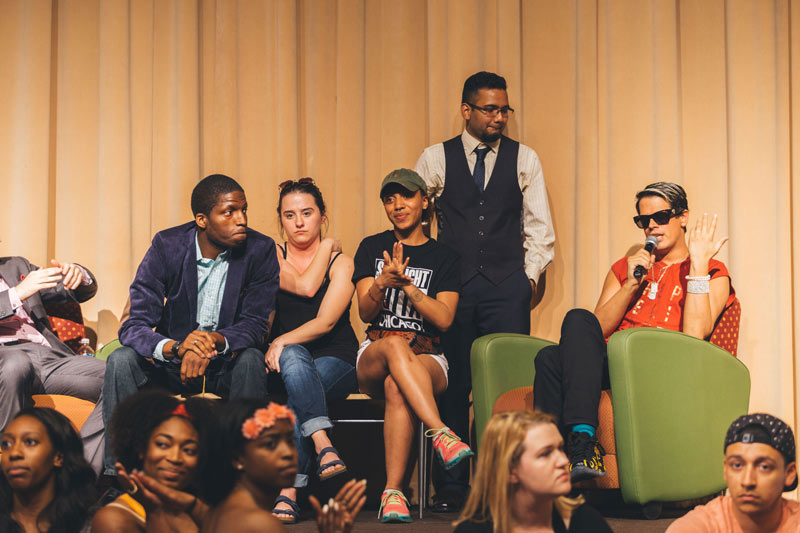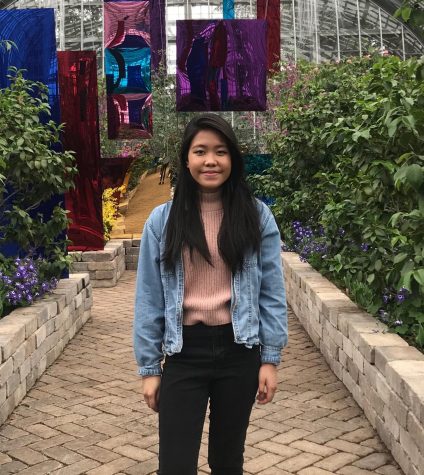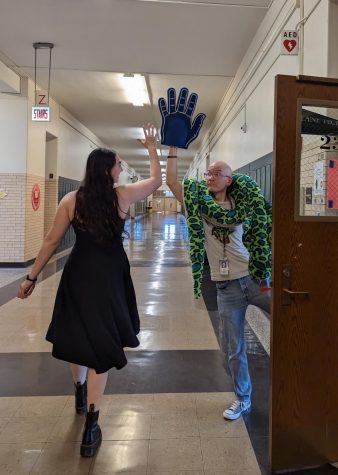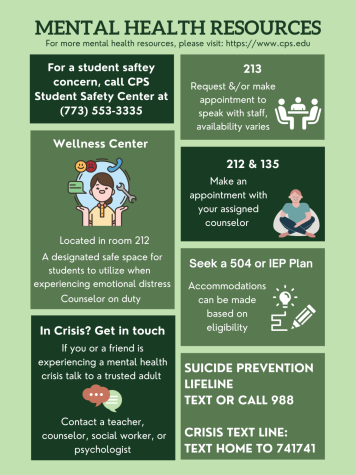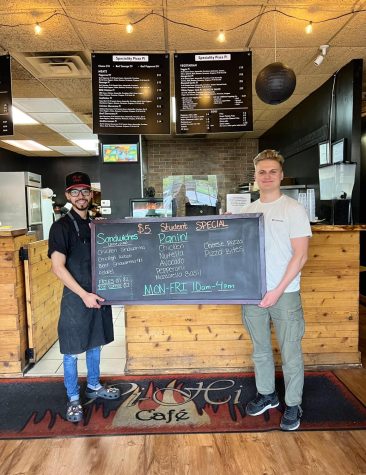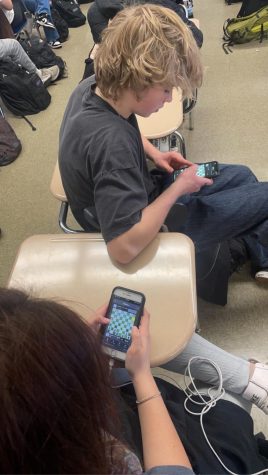The great divide on college campuses
Protesters, left, interrupt an event with Milo Yiannopoulos, right, at DePaul University, during May of last year. (Photo Courtesy Of Josh Leff/The DePaulia)
April 6, 2017
Increased debate, political tension, and protests have swept their way through the country and now onto college campuses.
University of California Berkeley, DePaul University, New York University, and Middlebury College are examples of colleges who’ve had a first hand experience of a growing trend on campus: conservative speakers receiving a backlash from protesters on campus events.
Some of these protests caused disruptions to the events while other protests escalated into riots, causing the events to be canceled due to safety concerns.
UC Berkeley received national attention early February for a protest turned riot against the event of Milo Yiannopoulos, a controversial former senior editor of Breitbart, an alt-right conservative news site.
In light of this incident, Sam Rodriguez, Div. 861, had an idea to make t-shirts which made clear of the true intentions behind these student movements. He plans on his t-shirts to include the words: “Students Don’t Riot. We Protest.”
“I saw some of the mainstream media freaking out about how this movement was totally false; I thought that that was unreasonable because protests is not wrong, rioting is wrong,” Rodriguez said. “It isn’t the movements that riot, it’s rioters that riot; it is people looking for the excuse to do damage.”
Protests are protected under the first amendment and provide a course of action for people to come together in solidarity in disagreement and also bring attention to a cause.
On the other hand, some of these protests on conservative speakers have proven to deepen the division between conflicting political views on campus.
“Protests become counterproductive when people base everything off of just pure emotion and not politics,” Brian O’Connell, a current sophomore at DePaul, said. “I think people get too offended by beliefs that they don’t agree with.”
According to the Foundation for Individual Rights in Education, the first amendment protects individual freedoms from government interference. Speech characterized as “indecent” or “hate speech” are protected as long as it does not intend to inflict bodily harm or directly incite “unlawful action.”
This does not apply for private organizations such as private universities, which are able to limit some academic freedoms if they do not follow their mission. Despite this, many private universities promote student expression and political discourse on campus which includes student organizations inviting guest speakers to events on campus.
However, conservative student organizations often face obstacles when organizing events, such as colleges prohibiting potential guest speakers from attending. Additionally, they may face increased security fees, raising the issue of a “heckler’s veto” which occurs when the use of freedom of speech is restricted or punished because of the hostile reactions of others to the speech.
The increase of political tension raises concern for colleges to reevaluate the implications and role of student protests in order to ensure an environment that promotes free speech for its students.
“I think that it’s important that [colleges] have any kind of speaker— conservative, liberal, libertarian; it doesn’t matter who it is,” Eric Platt, Div. 869, said.
In early March, a protest at Middlebury College of guest speaker, Charles Murray, a conservative social scientist, caused continued disruptions to his event. Murray and a Middlebury professor, who was supposed to moderate a Q&A after the speech, moved to a secret location to continue his speech on livestream and afterwards were attacked by protesters while trying to leave.
“The protesters protested for a good reason but I think they should have also eventually sat down and asked him questions,” Melisa Topic, Lane alum who is currently a sophomore at Middlebury, said. “The Q&A was a missed opportunity for both the students and him to interact but also to just better comprehend the situation.”
Even so, discussion between liberals and conservatives have proven to be easier said than done.
“I think for a lot of people it’s out of their comfort zones to have these discussions and listen to the other side,” Topic said. “Nobody likes having their ideas attacked or criticized and it’s definitely not the easiest conversation to have.”
When students step out of this comfort zone and openly discuss their political beliefs, it can result in a better understanding of one’s own beliefs.
“Students need to be challenged on new ideas and they should just listen to what people have to say,” O’Connell said. “When I hear my friends who identify as liberal, sometimes emotions gets the best of me and I’m like, ‘Dude, how can you believe that?’ but I think hearing the other side will shape you into a more educated person in your beliefs.”
While many students may disagree with the views and ideologies of conservative guest speakers, it is acknowledged that these events can be beneficial for students regardless of their political stance.
“We need to let them speak especially at those platforms because it’s better for that to be spoken in a controlled environment in a room of opposing ideas than where they are in their element,” Rodriguez said. “When they’re in their element they get to share their ideas with like-minded people and they get to reinforce their own ideas and everyone in that room does not get anything from that experience outside of just reinforcing their ideas.”
Platt emphasizes the importance of people having interactions with others of differing political views than their own.
“Your thoughts are free because you’re still a growing human being; you’re going to be learning lots of different things,” Platt said. “You can’t grow by getting spoonfed your ideas all the time.”
Based on her own found friendship with a conservative Republican in her Spanish class, Topic said that while they don’t agree on many issues, she was able to learn a lot about the other side of the political spectrum.
“You sometimes learn the most talking to the people you have the least in common with,” Topic said.
More exposure to others with beliefs of opposing political ideologies may ease the divide and tension on college campuses.
O’Connell said he hopes that as a result of more exposure, there can be “more understanding of what goes on and why people believe the things they do instead of such judgement and hatred.”
Many college campuses are continuing to find a balance where student protests and these events can coexist without the voices on both sides being drowned out in chaos.
“There is a deep divide in this country right now and it’s not going to be solved by avoiding the problem, looking the other way, not reaching out, not empathizing with the other side,” Rodriguez said. “As soon as you give in to that empathy gap, you are making the problem worse.”

